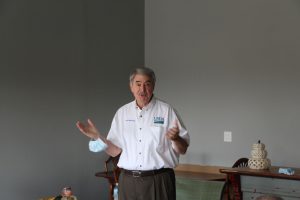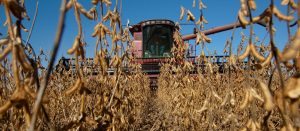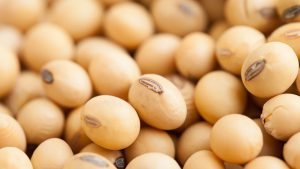Grain Marketing, Homepage Slider
Trade Talks
By Dusty Sonnenberg, CCA, Ohio Field Leader: a project of the Ohio Soybean Council and soybean checkoff.
International trade discussions often take place thousands of miles away from the soybean fields of Van Wert County. That was not the case recently when U.S. Congressman, Bob Latta, hosted USDA Under Secretary for Trade and Foreign Affairs, Ted McKinney, in Northwest Ohio. McKinney participated in a roundtable discussion with area farmers at the home of Ohio Soybean Council member Mike and Kendra Heffelfinger.

“Ted McKinney grew up on a family farm in Tipton, Indiana, and graduated from Purdue,” said Latta. “He was a state FFA Officer, and served as the Indiana Director of Agriculture under then Governor Mike Pence.”
The Under Secretary spent about an hour taking those in attendance for a trade “spin” around the world to discuss the current status of negotiations with key trade partners. “The first and most important thing I want you to understand is that I come from a faith background. I follow the golden rule, and growing up like you in the Midwest, would tend to think generally that people look at the world the same way you do – and that is categorically untrue,” said McKinney. “It is an eat or get eaten world out there in trade.”
Trade relationships often depend on the country and the culture. “Now there are good partners out there like Japan,” said McKinney. “They are a great partner. They are fair and they keep their word. They want to work with us. But many countries do not have that same philosophy. Others want to take advantage of us. I am thankful that the President and Secretary have given me permission to be tough (when necessary in negotiations).”

A good trade negotiation takes balance and compromise, and must be fair to both sides. “I tell everyone I negotiate with that I want a two-way street. I do not want anything that is not fair in their or our eyes,” said McKinney. “Often times Ag trade is not fair. We often have more to trade than they do. I work to find ways to make it a two-way street, and people appreciate that.”
China: “The big question most people ask is “will we make the goal?” I look at the markets today and I don’t know if we will make the goal, but so far, we will take what we are getting. We are finally bringing some profitability back to soy, corn, pork, poultry, and beef; a lot of the things you produce here. There is a lot more that could be done with fruits and vegetables, tobacco, ethanol, and DDG’s,” said McKinney. “There is still time. The Phase 1 Agreement is truly significant. While they may or may not meet their $36.5 Billion commitment, we seem to be on our way, and are getting a head start on the next marketing year as well. We are going to keep nudging and remind them of their commitment. Phase 1 is a two-year deal, and the orders for shipment after December 31 will give us a start for next year. This was signed the end of December, but due to COVID, did not really start until April.”
NAFTA and USMCA: “The North American Free Trade Agreement (NAFTA) did well for us. NAFTA was good to Ag., but from the President’s viewpoint it was not good for everyone. It was not good for the auto industry, and others in our country,” said McKinney. “We got a better deal now. The U.S. Canada, Mexico Agreement (USMCA) is a better deal for Ag and a better deal for other industries. This deal has teeth in it, and we can use it to rectify things (that we could not under NAFTA).”
“The best part of the USMCA is relatively unknown to most. They re-wrote the Sanitary and Phytosanitary chapters. This is where they usually get you,” said McKinney. “Europe is an example of this with GMO’s. It’s often used to create market disruption. The same goes with the Bio-sciences chapter and looking at how we treat GMO’s and gene editing. You can bet we are going to try to cut and paste those two chapters into future agreements with other countries.”
Canada: “The wheat deal under NAFTA was a problem. The determination of food grade vs. feed grade wheat between the two countries and the price difference was not right. It is now getting straightened out. The same with fermented and distilled spirits, and the unfair trade practices Canada had in place. Those are being resolved under the USMCA,” said McKinney.
Japan: “In the nick of time, we negotiated a free trade agreement “light”. Now we are on almost identical trade and tariff reduction schedules so that we can compete with all the countries that formed the Transpacific Partnership (TPP); and the Beef, Pork, and Poultry are really flowing there,” said McKinney. The beauty of Japan is that they take the Offals, and they really enjoy the prime cuts as well. They are buying! Japan is a great deal.”
United Kingdom (U.K.): “I am optimistic about the U.K.,” said McKinney. “Everyone knows how negotiations, are and that the toughest part is at the end. We’re not there yet with the U.K. but the story is really very different than what you hear in the news media. We know that their biggest concern is what they consider their “Gold Standard” for animal welfare. I don’t see that there is that much difference between how we treat our animals in the U.S. and who they treat them in the U.K. We have offered for them to randomly inspect any facility here to see what it is like. Our standards are very similar, and we will not negotiate that away. Animal welfare has never been in a trade agreement with a tariff based on the care of the animal, and we are not going to let it start now, period.”

Kenya (Africa): “We started negotiations with them, but several of their negotiators got COVID. They are doing fine now, but that slowed things up,” said McKinney. “This is not just Kenya as an end game, it’s all of Africa as an end game, and they know that, and they embrace it. It has been tough to get into Africa, partly because there is so much corruption at the ports and at the borders, and our companies play an ethical game, and they just don’t want to be faced with that. But a lot of that, not all but a lot of that has been fixed. Many of those countries have gotten a taste of what dealing with China is like, and it is two different stories. On one hand is they are pleased to get money for infrastructure for roads and bridges and such, but on the other hand it has a “long tail” (a lot of strings attached). They are now coming to us saying they will still continue to do business with China, but they want to work with us as well.”
“Kenya came to us, to teach them about risk assessment,” said McKinney. “They are very tied to Europe, and they are aware of the nefarious things going on in Europe as to how they assess risk. Kenya is now adopting a risk assessment plan regarding pesticides, and vet drugs, and infant formula and food coloring, and all the things that go along with a human food safety assessment. I am optimistic about Africa. It is a long road, probably decades long, but our kids and grandkids will probably get the benefit of it.”
Europe: “I am very worried about Europe,” said McKinney. “After mad cow disease, Europe took on the Precautionary Principal, which basically means they will take no risk. Once Greenpeace or an activist group says there is a risk, then they believe that there is a risk. In the meantime, the things Europe is imposing on their farmers and their consumers is just beyond compare to how we would look at risk.” 
“A few years ago, Europe changed how they assess pesticide risk,” said McKinney. “Europe has set a maximum residue level (MRL) of zero, and it applies regardless of when the detection occurs. A product can leave our ports as pure, but if at any time it is tested and changes; on the ship, in their storage, whenever, then it becomes our problem and they reject it. It is a horrible disrupter of trade. They have an “E.U. Green Deal” that they have branded “Farm to Fork”, and it calls for a 50% elimination of pesticides and a 1/3 elimination of fertilizer.”
“In the U. S. we met the goals they set, by using technology,” said McKinney. Biotechnology and Precision Agriculture have met the goals they are looking to advance. Biotechnology has allowed us to reducing pesticide use and the precision placement of fertilizer has allowed for more efficient use with soil testing and prescription variable rate application. We are meeting their goals on our farms now. “The (trade disruption) trick is that they are not just imposing these standards on their farms, but also anyone who exports to them must also follow the same, and they regulate it through their zero tolerance maximum residue limits. It doesn’t matter what we can achieve through technology, if their farmers cannot use it, those who trade with them cannot either. This effectively eliminates our exports to them, which is their goal.”
“Europe is becoming a major problem because they are exporting this philosophy to the rest of the world, in particular Mexico,” said McKinney. “Mexico is becoming difficult. They have not approved any new biotech traits since May of 2018, and nothing with any new pesticides there.”
Western Hemisphere: “Overall trade is fantastic in the Western Hemisphere for the U.S. with the exception of a few cases in Venezuela, Cuba, and Bolivia, we are fully aligned,” said McKinney.
Brazil: “Brazil is a striving competitor, especially in soybeans. In a couple years they will be the number one producer of soybeans in the world. They are now producing a lot of corn and ethanol, however most of their ethanol is from cane sugar rather than corn. They are a competitor, but they are also friends in that they see the world as we do when it comes to technology,” said McKinney. “When someone tells them no more biotech, no more animal vet drugs, all those things, they respond like we do. I would put Argentina and Canada in that same boat. The Western Hemisphere is fully aligned. Brazil is still growing-up on the world trade stage.”
“U.S. Secretary of Agriculture, Sonny Perdue, formed an Ag 5 Group. These are the Agriculture Ministers form Canada, Mexico, Brazil, Argentina and the U.S. We are very aligned on our outlook on most things. We are leading that group. We keep encouraging them to come up with ideas, and being firm that they also need to step up and take leadership. We are not about to go out and sell ethanol to the world, and get them to accept it then have Brazil come in the back door and undercut us with a lower greenhouse gas score or sell it cheaper. We are in a Reagan-esque moment of Trust but Verify. We will work with them; we think we can. We are all very like-minded in our desire to push ethanol around the world. We just need to hold them accountable at the same time. Trade with China is a similar situation. They have had the same frustrations with China that we have. They have not taken a tough stance with China. We have had this discussion; we all need to hold China accountable.”
India: “India is the tale of two cities,” said McKinney. “India still has remnants of the old communist movement. Some in India believe they can be still self-sufficient; but they can’t. Our relationship with India is growing and growing rapidly. We are becoming more aligned. The relationship is good, and we have got to keep working on it and be patience. We removed their generalized system of preference. (These are monies, in the form of tax credits, that Congress allows the government to use.) Those were taken away. We removed $6 Billion, and they know it and want it back. The problem is that they just want to play by the rules that they want to play by. Trade can be counter-intuitive. When there is demand, a rising tide raises all ships. One time they did not put a tariff on our apples, and apple consumption in India started to rise, both for our apples and for theirs. Their apple growers were doing better and our apple growers were doing better. Then, being India, they threw a tariff up and apple consumption declined. They didn’t get it. They have the potential to be one of our finest trading partners ever. They may never get to the level of trust like Japan, but they want and need a lot of our stuff. I never miss an event at the ambassador’s home, or their embassy, or the industry/government organizations that support India. They are that important.”
Asia Pacific: “This is a diversification opportunity,” said McKinney. “Vietnam is buying and buying big. The Philippines are buying and buying big. Indonesia was being very difficult. It took two trips and threatening to take away their generalized system of preference. These are monies, in the form of tax credits, that Congress allows the government to use. The $6 Billion in a tax credits got their attention. We just want everyone to play by the rules. We are now exporting a nice amount to Indonesia, and it is getting better. Asia Pacific is where I am spending a lot of my time.”
“My attention will be in Asia Pacific, add to that the United Kingdom, and keeping the Western Hemisphere countries aligned because China is knocking on that door all the time,” said McKinney. “This is where we can diversify our markets. That does not mean we are walking away from China. No five countries in Southeast Asia can make-up for China, but it is a diversification strategy so we are not quite hung out if something goes awry.”